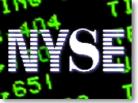|
NYSE to wait till next year
|
 |
June 3, 1999: 7:43 p.m. ET
Exchange delays longer trading day as SEC hoped; Y2K, decimal switch cited
By Staff Writer Jamey Keaten
|
NEW YORK (CNNfn) - In an abrupt about-face, The New York Stock Exchange agreed Thursday to put off plans to extend trading hours until at least the second half of next year.
NYSE Chairman Richard Grasso said the Big Board wants to tackle the Y2K bug and a shift decimal-based stock quotes instead of the current fraction system before jumping into extended trading hours.
"We were unanimous this morning in our view that nothing should happen -- at least from the Big Board -- until after both the millennium change and 'decimalization' have been accomplished," Grasso said at a news conference at the NYSE Thursday.
News of the delay was greeted with relief by many Wall Street experts who had feared the world's largest stock market was rushing to offer extended trading hours to meet growing competition from electronic trading systems.
Just 10 days ago, Grasso said the exchange hoped to begin an evening session, running as late as 10 p.m. ET, by July at the earliest. The Big Board's trading now day runs 9:30 a.m. to 4 p.m.
Reticence was rife
An evening trading session would benefit investors on the West Coast -- California is home to the largest number of NYSE investors in a single state -- by making trading available past 1 p.m. Pacific Time.
The delay puts the NYSE in line with the wishes of the U.S. Securities and Exchange Commission, the Big Board's regulator. On recent occasions, SEC Chairman Arthur Levitt said his preference would be for the exchange to wait until after the start of the new year to avoid complications with the Y2K bug.
The Y2K bug is a phenomenon by which some of the nation's computers, as they make the transition to the year 2000, may read the year as 1900 or stop functioning altogether.
While that concern will push the launch date past the start of the year, the double whammy comes from the Big Board's conversion to a decimal system, which won't be completed until the second quarter of next year.
The SEC wasn't alone is its hesitancy about the proposed rush into extended trading hours. Wall Street, which would have had to mobilize quickly, also had its reservations.
"It would have been an enormous staffing situation for the Street to swing into action in a month. ... It's madness," said Larry Wachtel, a market analyst at Prudential Securities. "I am relieved, frankly, they're doing it in a leisurely way."
Evening hours eyed by investors
An evening session would likely appeal to individual investors, rather than institutions that typically are open only nine-to-five. That, said Grasso, runs the risk of low-volume, and thus high-volatility, trading sessions in the evening.
The NYSE has been feeling pressure to extend its hours to keep up with the surging demand for trading options as investors pour into the stock market.
Rising to meet that demand -- presenting a competitive threat to both the NYSE and the Nasdaq exchange -- have been the after-hours electronic communications networks known as ECNs.
"Whatever the competitive arguments may be for a more timely introduction of extending the trading day, the overriding interest should be the protection of the public user of the marketplace," Grasso said.
The National Association of Securities Dealers, which operates the Nasdaq, has said it wants to extend its hours by this fall for its most-traded 100 issues.
A spokesman for Nasdaq declined to comment on the NYSE news.
|
|
|
|
|
 |

|

